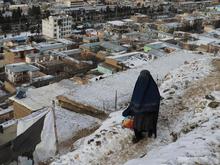Dozens of people have died in a cold snap in Afghanistan. At least 70 people have died since the cold snap began about a week ago, the Ministry of Disaster Management in Kabul said on Wednesday. In addition, 70,000 head of cattle perished, an important source of food and income for many Afghans.
Cold winters are not uncommon in Afghanistan, but temperatures are falling particularly low this year. In the capital Kabul, temperatures of down to minus 20 degrees were reported on some days. Residents of the capital reported to the dpa about frozen water pipes. Heavy snow has blocked the main roads in many places, as the disaster management also reported.
In the central region of Ghor, minus 33 degrees were measured over the weekend. Heavy snow blocked roads in several provinces in the center and north of the country, images circulating online showed.
This winter is by far the coldest in recent years.
Mohammed Nasim Muradihead of the Afghan meteorological authority
“This winter is by far the coldest in recent years,” Afghan Meteorological Agency chief Mohammed Nasim Muradi told AFP. “We expect the cold spell to continue for a week or more.”
Extreme weather could pose even more problems for Afghanistan in the future, as the country is one of the countries most threatened by climate change. Afghanistan itself has hardly contributed to global emissions.
Afghanistan is internationally isolated because of its radical Islamic Taliban government. Even before the cold snap, the country was already experiencing one of the worst humanitarian crises in the world. More than half of its 38 million inhabitants have no secure food supply, three million children are at risk of malnutrition.
Taliban restrict work of aid organizations
International humanitarian aid to Afghanistan was further curtailed after the Taliban’s December 24 decision to bar women from aid work. According to Caritas director Oliver Müller, aid organizations have been faced with a dilemma ever since.
“We cannot behave properly and we are not satisfied with any of our options for action,” Müller told the newspapers of the Diocesan Press publishing group, with a view to the aid agency’s decision to suspend part of the work in Afghanistan. Her job is to help people in need. “But we can’t continue working under these conditions.”
Müller emphasized that stopping aid for the people affected was a disaster. “They are weakened by the drought and natural disasters of the past, by the war and the chaos after the Taliban took power,” he said.
Due to the occupational ban, Caritas can no longer reach women in need directly, because in Afghanistan it is not allowed for a strange man to speak to a woman. “The professional ban hits the nerve of humanitarian aid,” said Müller. At the moment they could only give groceries to the male-dominated local councils. “That is not acceptable. We could not ensure that the aid really gets there.”
In order for Caritas to fully resume its work, the employees must have access to women and children, said Müller. He said he wasn’t very optimistic about a possible solution. “One chance could be that the regime is dependent on support from outside, on other states and the help of the United Nations.” Politicians must increase the pressure on the Taliban. (AFP/dpa/epd)
To home page


